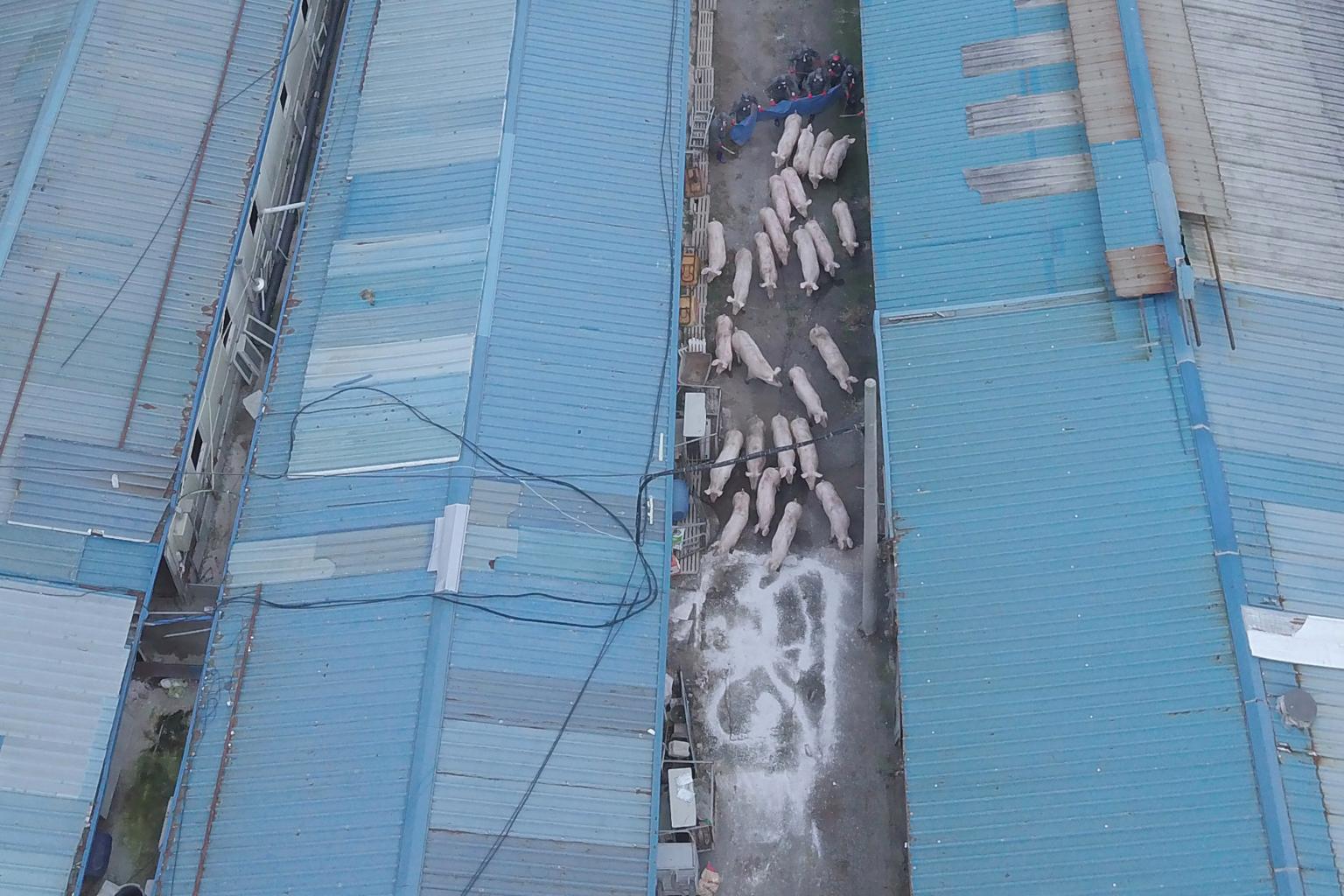South Korea to deploy snipers to hunt down North Korea's sick pigs
Sign up now: Get insights on Asia's fast-moving developments

Workers at a farm herding pigs infected with African swine fever to be killed in Paju, a city near the inter-Korean border, on Sept 17, 2019.
PHOTO: AFP
SEOUL (BLOOMBERG) - South Korea will send military snipers and civilian hunters to its northern border on Tuesday (Oct 15) to eliminate wayward, contagion-carrying pigs from the reclusive neighbouring state led by Kim Jong Un.
The government will also use thermal vision drones to search for hogs infected with African swine fever near the civilian control line, a buffer region near the strip of land dividing the Korean Peninsula, the agriculture ministry said on Sunday.
The intensified measures aim to exterminate feral pigs in areas including Incheon, Seoul, Goseong and Bukhan River.
Five wild boars were found dead in or near border areas this month before being tested positive for the viral haemorrhagic disease, officials in South Korea said.
The finding reflects the freedom with which animals roam the area, and hints at a spillover of the deadly virus from North Korea, where unofficial reports indicate the disease is spreading out of control.
African swine fever has reached almost all areas of North Korea, and pigs in the western province of North Pyongan have been "wiped out", said Ms Lee Hye-hoon, who chairs the National Assembly's intelligence committee, citing South Korea's National Intelligence Service.
By official accounts, the virus wreaking havoc across Eastern Asia has virtually skipped over North Korea. It killed just 22 hogs in May on a cooperative farm about 260km north of Pyongyang, near the border with China, according to North Korea's agriculture ministry in a May 30 report to the World Organisation for Animal Health, or OIE.
But since then, there have been no follow-up reports to the Paris-based veterinary body, and scant coverage of the event in state media.
North's food security in jeopardy
The Food and Agriculture Organisation (FAO) has no information beyond the report received by the OIE, said Dr Wantanee Kalpravidh, the United Nations agency's Bangkok-based regional manager of the Emergency Centre for Transboundary Animal Diseases. The FAO is awaiting approval to send a delegate to North Korea, she said in a text message on Friday.
Widespread transmission of African swine fever, which isn't known to harm humans but kills most pigs in a week, may put North Korea's food security in graver jeopardy.
Crop production there is forecast to be smaller than usual for the rest of 2019 due to below-average rainfall and low water supplies for irrigation, the FAO said last month.
About 40 per cent of the population, or 10.1 million people, are estimated to be food-insecure and in urgent need of food assistance, according to results from an UN assessment conducted last April.
African swine fever will worsen hunger and malnutrition, said Mr Cho Chunghi, who fled North Korea in 2011 after spending a decade working for the government's animal disease control programme. Many North Korean households raise pigs to earn money to buy rice.
"Pork accounts for about 80 per cent of North Korea's protein consumption, and with global sanctions taking place, it's going to be hard for the country to find an alternative protein source," said Mr Cho, who now works as a researcher at Good Farmers, a Seoul-based non-governmental organisation that supports developing nations to generate profit through agricultural activities.
"The virus is extremely destructive, as people are now unable to make money through raising pigs, while the country's economy is restrained," he said.
Pigs raised by individual farms outnumber those on state-owned and collective farms, which will make it almost impossible to halt the spread, especially given North Korea's inexperience preventing and mitigating epidemics in animals, he said.
Disease could re-enter China, Russia
This lack of capacity is a threat to the entire Korean Peninsula, where the virus could become endemic, or generally present.
That would make it more difficult to stamp out the disease through the usual steps of quarantining and culling diseased and vulnerable livestock. From there, it could also re-enter neighbouring China and Russia.
The military and civilian hunters will be sent to Paju, Hwacheon, Inje, Yanggu, Goseong from Tuesday to shoot dead wild boars, officials in Seoul said, adding that the number of pig-assassins will be decided on Monday.
If the strategy is proven to be effective and safe, the government will consider deploying more troops across an expanded hunting area.
South Korea has deployed seven helicopters to disinfect parts of the 250km-long border-barrier. More than a dozen outbreaks have occurred on nearby farms since the virus was first reported there a month ago.
Officials have culled 154,548 pigs at 94 farms as of Monday, according to the nation's agriculture ministry. Routine tests for the virus on wild boars were introduced before Pyongyang reported the outbreak, the Ministry of Environment said in a statement last Wednesday. Now, streams and soil near the border are also being tested.
"So far, the South Korean veterinary authorities have managed to prevent the spread of African swine fever from the border area southwards," the International Society for Infectious Diseases' ProMED-mail programme said in an e-mail on Monday. "Repeated virus introductions from North Korea, most likely by wild boar, may challenge their remarkable efforts."
South Korea has repeatedly asked Pyongyang to join a collective effort to fight the transmission, but its northern neighbour hasn't responded.
"The fact that North Korea has reported the outbreak to an international organisation suggests the situation is probably getting out of their hands," said Mr Ahn Chan-il, a former North Korean soldier who defected in 1979 and now heads the World Institute for North Korea Studies.
"It's an apocalypse in the making."


